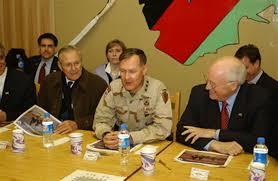On what we all could have known, or what we all knew - Thomas Gibbons-Neff in NYT:
'The United States military achieved a quick but short-term victory over the Taliban and Al Qaeda in early 2002, and the Pentagon’s focus then shifted toward Iraq. The Afghan conflict became a secondary effort, a hazy spectacle of nation building, with intermittent troop increases to conduct high-intensity counterinsurgency offensives — but, over all, with a small number of troops carrying out an unclear mission.
Even as the Taliban returned in greater numbers and troops on the ground voiced concerns about the American strategy’s growing shortcomings, senior American officials almost always said that progress was being made.
The documents obtained by The Post show otherwise.
“We were devoid of a fundamental understanding of Afghanistan — we didn’t know what we were doing,” said Douglas Lute, a retired three-star Army general who helped the White House oversee the war in Afghanistan in both the Bush and Obama administrations.
“What are we trying to do here?” he told government interviewers in 2015. “We didn’t have the foggiest notion of what we were undertaking.”'
(...)
'In 2010 this pressure trickled down to troops on the ground, as they answered to commanders eager to show progress to senior leaders, including Gen. Stanley A. McChrystal, then the commander of all American troops in Afghanistan. But the facts were that the fledgling Afghan military performed poorly in the field and that the American “clear, hold, build” counterinsurgency strategy had little hope of succeeding.
“Afghans knew we were there temporarily, and that affected what we could do,” Marc Chretien, who served as the senior State Department adviser to the Marines in Helmand Province, said in one interview. “An elder in Helmand once told me as much, saying: ‘
(...)
'Lt. Col. Thomas Campbell, a Pentagon spokesman, issued a statement late Monday saying that “there has been no intent” by the Defense Department “to mislead Congress or the public.” He said that “most of the individuals interviewed spoke with the benefit of hindsight.”
The Washington Post published its report just as talks between the United States and the Taliban have restarted for another round of peace negotiations in Doha, Qatar. In September, President Trump abruptly called off months of the talks after a suicide blast in Kabul that killed an American soldier and 11 others.
During a recent trip to Bagram Air Field in Afghanistan over the Thanksgiving holiday, Mr. Trump said the United States would stay in Afghanistan “until such time as we have a deal, or we have total victory, and they want to make a deal very badly.” Mr. Trump also reaffirmed that he wanted to reduce the American military presence in the country to 8,600 troops, down from about 12,000 to 13,000.
In one 2003 memo cited by The Post from Donald H. Rumsfeld, the defense secretary at the time, he declared, “I have no visibility into who the bad guys are.”'
Read the article here.
What else is tere to say: "Your Marines live in tents. That’s how I know you won’t be here long."
Mr. Rumsfeld with his visibility is also delightful.
Well, some people had a certain amount of visibility, they saw Mr. Rumsfeld and they recognized the bad guy.
